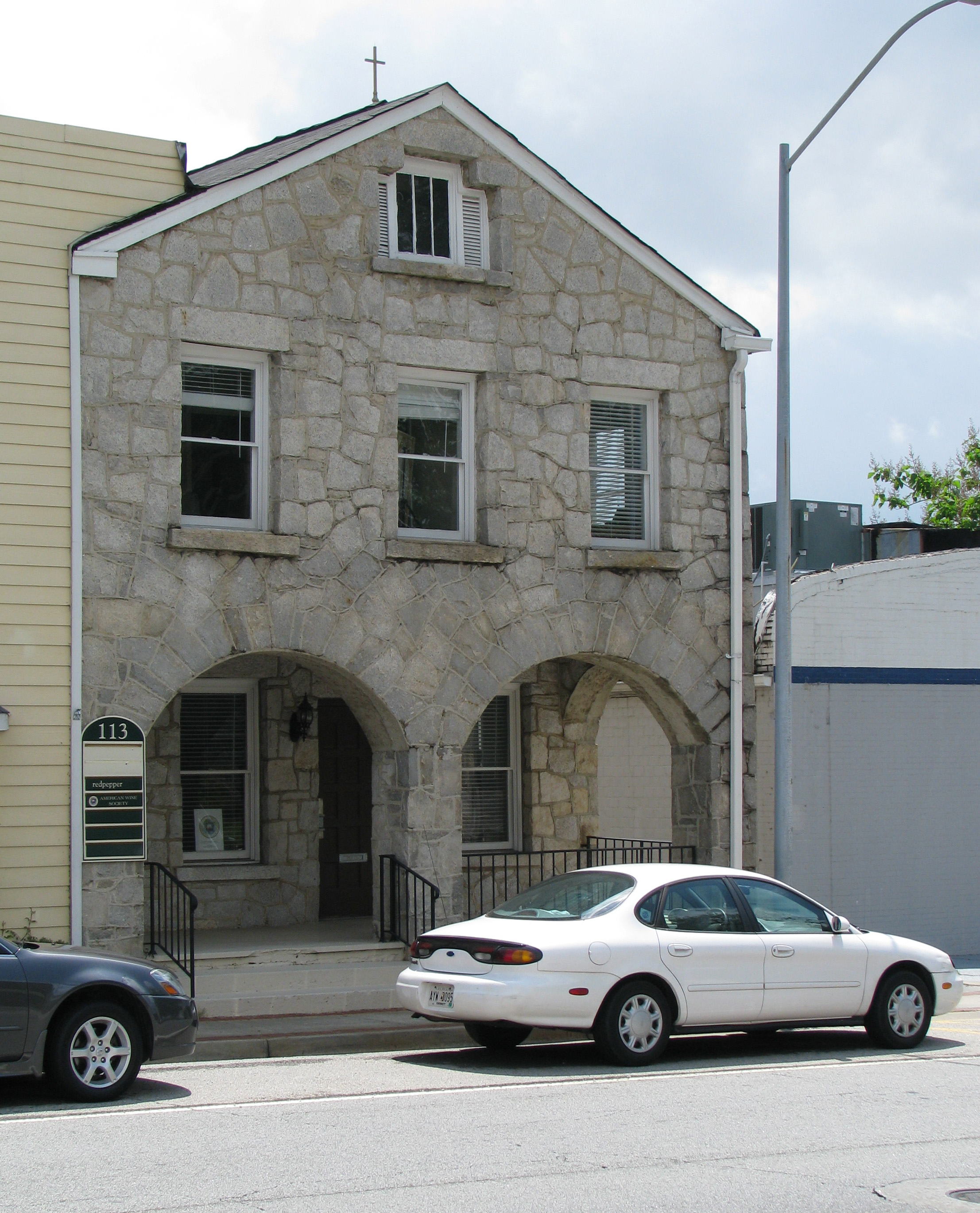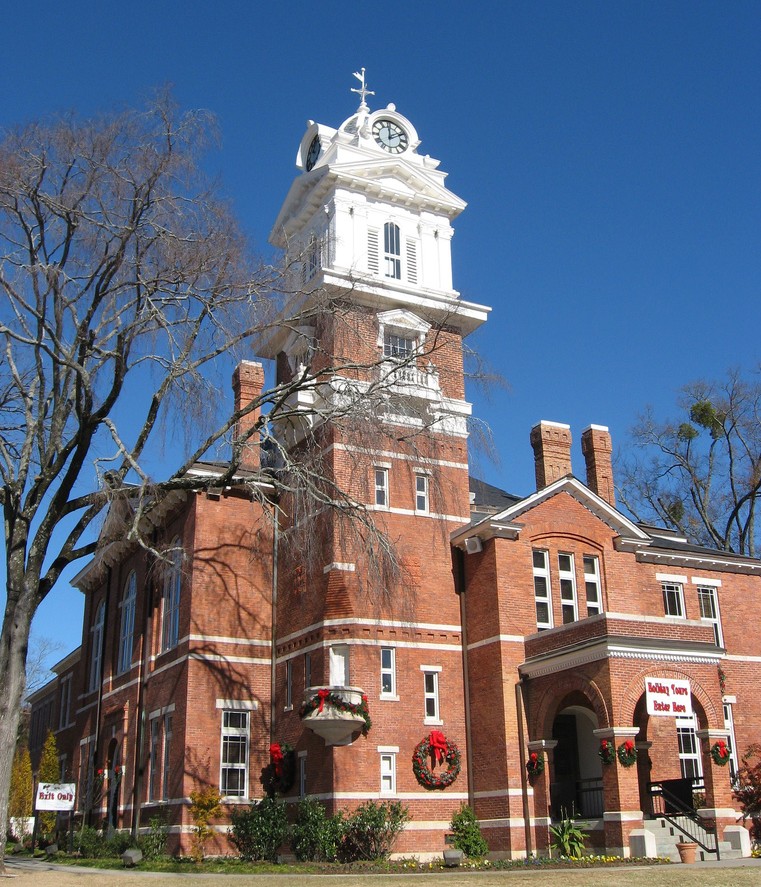|
Gwinnett County Courthouse
The Gwinnett Historic Courthouse is an historic government building located at 185 West Crogan Street in Lawrenceville in Gwinnett County, Georgia. The original county courthouse burned in 1872. The present day Courthouse was built in 1885. It served as the center of county business for over a century. As the population of the county grew, the Courthouse could no longer handle all of the county's business. In 1988, Gwinnett County moved the majority of its operations into the new Justice and Administration Building located at 75 Langley Drive in Lawrenceville. The old Courthouse underwent a lengthy three year renovation starting in 1989. It reopened on July 3, 1992, as the Gwinnett Historic Courthouse. Today, it serves as a rental venue for weddings, concerts, conferences, and other special events. It is one of the parks maintained by the Gwinnett County Parks and Recreation Department. On September 18, 1980, it was added to the National Register of Historic Places. In 1993, a s ... [...More Info...] [...Related Items...] OR: [Wikipedia] [Google] [Baidu] |
Lawrenceville, Georgia
Lawrenceville is a city in and the county seat of Gwinnett County, Georgia, United States. It is a suburb of Atlanta, located approximately northeast of downtown. As of the 2020 census, the population of Lawrenceville was 30,629. In 2019, the U.S. Census Bureau estimated the city population to be 30,834. Lawrenceville has six ZIP codes (30042-30046, 30049), and it is part of the 678/770/404 telephone area code, which is used throughout metropolitan Atlanta. History Lawrenceville was incorporated by an act of the Georgia General Assembly on December 15, 1821. This makes Lawrenceville the second oldest city in the metropolitan Atlanta area. The city is named after Commodore James Lawrence, commander of the frigate ''Chesapeake'' during the War of 1812. Lawrence, a native of New Jersey, is probably best known today for his dying command, "Don't give up the ship!" William Maltbie, the town's first postmaster, suggested the name of "Lawrenceville." In 1821, a permanent site for th ... [...More Info...] [...Related Items...] OR: [Wikipedia] [Google] [Baidu] |
Gwinnett County, Georgia
Gwinnett County ( ) is located in the north central portion of the U.S. state of Georgia (U.S. state), Georgia. It forms part of the Atlanta metropolitan area. In 2020 United States census, 2020, the population was 957,062, making it the second-most populous county in Georgia (after Fulton County, Georgia, Fulton County). Its county seat is Lawrenceville, Georgia, Lawrenceville. The county is named for Button Gwinnett, one of the signatories of the United States Declaration of Independence, Declaration of Independence. Gwinnett County is included in the Atlanta metropolitan area, Atlanta-Sandy Springs-Roswell, GA Metropolitan Statistical Area. It is located about 10 miles northeast of Atlanta's city limits. History In 1813, Fort Daniel was created during the War of 1812 in territory that would become Gwinnett County. The county was created in 1818 by an act of the Georgia General Assembly, Gwinnett County was formed from parts of Jackson County, Georgia, Jackson County (form ... [...More Info...] [...Related Items...] OR: [Wikipedia] [Google] [Baidu] |
National Register Of Historic Places
The National Register of Historic Places (NRHP) is the United States federal government's official list of districts, sites, buildings, structures and objects deemed worthy of preservation for their historical significance or "great artistic value". A property listed in the National Register, or located within a National Register Historic District, may qualify for tax incentives derived from the total value of expenses incurred in preserving the property. The passage of the National Historic Preservation Act (NHPA) in 1966 established the National Register and the process for adding properties to it. Of the more than one and a half million properties on the National Register, 95,000 are listed individually. The remainder are contributing resources within historic districts. For most of its history, the National Register has been administered by the National Park Service (NPS), an agency within the U.S. Department of the Interior. Its goals are to help property owners and inte ... [...More Info...] [...Related Items...] OR: [Wikipedia] [Google] [Baidu] |
Confederate States Of America
The Confederate States of America (CSA), commonly referred to as the Confederate States or the Confederacy was an unrecognized breakaway republic in the Southern United States that existed from February 8, 1861, to May 9, 1865. The Confederacy comprised U.S. states that declared secession and warred against the United States during the American Civil War: South Carolina, Mississippi, Florida, Alabama, Georgia, Louisiana, Texas, Virginia, Arkansas, Tennessee, and North Carolina. Kentucky and Missouri also declared secession and had full representation in the Confederate Congress, though their territory was largely controlled by Union forces. The Confederacy was formed on February 8, 1861, by seven slave states: South Carolina, Mississippi, Florida, Alabama, Georgia, Louisiana, and Texas. All seven were in the Deep South region of the United States, whose economy was heavily dependent upon agriculture—particularly cotton—and a plantation system that relied upon enslaved ... [...More Info...] [...Related Items...] OR: [Wikipedia] [Google] [Baidu] |
Removal Of Confederate Monuments And Memorials
More than 100 monuments and memorials to the Confederate States of America (CSA; the Confederacy) and associated figures have been removed, all but five since 2015. Some have been removed by state and local governments; others have been torn down by protestors. More than 700 such monuments and memorials have been erected on public land in the United States, the vast majority in the Southern United States, South during the era of Jim Crow laws from 1877 to 1964. Efforts to remove them increased after the Charleston church shooting (2015), the Unite the Right rally (2017), the murder of George Floyd (2020), and other incidents. Proponents of their removal cite historical analysis that the monuments were not built as memorials, but to intimidate African Americans and reaffirm white supremacy after the American Civil War, Civil War; [...More Info...] [...Related Items...] OR: [Wikipedia] [Google] [Baidu] |
George Floyd Protests
The George Floyd protests were a series of protests and civil unrest against police brutality and racism that began in Minneapolis on May 26, 2020, and largely took place during 2020. The civil unrest and protests began as part of international reactions to the murder of George Floyd, a 46-year-old African American man who was murdered during an arrest after Derek Chauvin, a Minneapolis Police Department officer, knelt on Floyd's neck for 9 minutes and 29 seconds as three other officers looked on and prevented passers-by from intervening. Chauvin and the other three officers involved were later arrested. In April 2021, Chauvin was found guilty of second-degree unintentional murder, third-degree murder, and second-degree manslaughter. Chauvin was sentenced to 22.5 years in prison with possibility of supervised release after 15 years for second-degree murder in June 2021. The George Floyd protest movement began hours after his murder as bystander video and word of mouth ... [...More Info...] [...Related Items...] OR: [Wikipedia] [Google] [Baidu] |
Gwinnett County Courthouse In 2005
Gwinnett County ( ) is located in the north central portion of the U.S. state of Georgia. It forms part of the Atlanta metropolitan area. In 2020, the population was 957,062, making it the second-most populous county in Georgia (after Fulton County). Its county seat is Lawrenceville. The county is named for Button Gwinnett, one of the signatories of the Declaration of Independence. Gwinnett County is included in the Atlanta-Sandy Springs-Roswell, GA Metropolitan Statistical Area. It is located about 10 miles northeast of Atlanta's city limits. History In 1813, Fort Daniel was created during the War of 1812 in territory that would become Gwinnett County. The county was created in 1818 by an act of the Georgia General Assembly, Gwinnett County was formed from parts of Jackson County (formerly part of Franklin County) and from lands gained through the cession of Creek Indian lands. Named for Button Gwinnett, one of the signatories of the Declaration of Independence ... [...More Info...] [...Related Items...] OR: [Wikipedia] [Google] [Baidu] |
Courthouses On The National Register Of Historic Places In Georgia (U
A courthouse or court house is a building that is home to a local court of law and often the regional county government as well, although this is not the case in some larger cities. The term is common in North America. In most other English-speaking countries, buildings which house courts of law are simply called "courts" or "court buildings". In most of continental Europe and former non-English-speaking European colonies, the equivalent term is a palace of justice ( French: ''palais de justice'', Italian: ''palazzo di giustizia'', Portuguese: ''palácio da justiça''). United States In most counties in the United States, the local trial courts conduct their business in a centrally located courthouse. The courthouse may also house other county government offices, or the courthouse may consist of a designated part of a wider county government building or complex. The courthouse is usually located in the county seat, although large metropolitan counties may have satellite or ... [...More Info...] [...Related Items...] OR: [Wikipedia] [Google] [Baidu] |
Buildings And Structures In Gwinnett County, Georgia
A building, or edifice, is an enclosed structure with a roof and walls standing more or less permanently in one place, such as a house or factory (although there's also portable buildings). Buildings come in a variety of sizes, shapes, and functions, and have been adapted throughout history for a wide number of factors, from building materials available, to weather conditions, land prices, ground conditions, specific uses, prestige, and aesthetic reasons. To better understand the term ''building'' compare the list of nonbuilding structures. Buildings serve several societal needs – primarily as shelter from weather, security, living space, privacy, to store belongings, and to comfortably live and work. A building as a shelter represents a physical division of the human habitat (a place of comfort and safety) and the ''outside'' (a place that at times may be harsh and harmful). Ever since the first cave paintings, buildings have also become objects or canvasses of much artist ... [...More Info...] [...Related Items...] OR: [Wikipedia] [Google] [Baidu] |
County Courthouses In Georgia (U
A county is a geographic region of a country used for administrative or other purposesChambers Dictionary, L. Brookes (ed.), 2005, Chambers Harrap Publishers Ltd, Edinburgh in certain modern nations. The term is derived from the Old French denoting a jurisdiction under the sovereignty of a count (earl) or a viscount.The Oxford Dictionary of English Etymology, C. W. Onions (Ed.), 1966, Oxford University Press Literal equivalents in other languages, derived from the equivalent of "count", are now seldom used officially, including , , , , , , , and ''zhupa'' in Slavic languages; terms equivalent to commune/community are now often instead used. When the Normans conquered England, they brought the term with them. The Saxons had already established the districts that became the historic counties of England, calling them shires;Vision of Britai– Type details for ancient county. Retrieved 31 March 2012 many county names derive from the name of the county town (county seat) with th ... [...More Info...] [...Related Items...] OR: [Wikipedia] [Google] [Baidu] |







